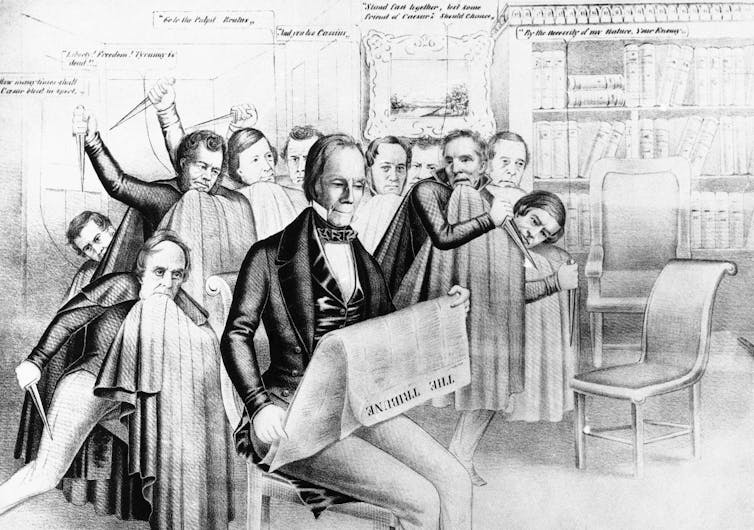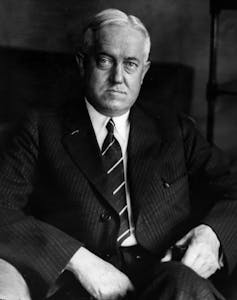Beware the brokered convention that breaks up the party

Beware the brokered convention that breaks up the party

Brokered conventions are a cloak-and-dagger affair. Just ask Henry Clay. AP Photo
Calvin Schermerhorn, Arizona State University
Despite numerous polls and seemingly endless debates, the identity of the next Democratic presidential candidate is still far from clear.
If the upcoming Iowa caucuses and winter primaries fail to winnow a crowded field, the July Democratic National Convention in Milwaukee might yield a surprise. The primary map is currently wide open, and with two billionaire dark horses stalking the field, the party could well end up with something many in the party dread: a brokered convention.
Brokered conventions are those which begin with no candidate having met the threshold for nomination. During such a convention, party insiders persuade delegates to switch votes or pressure low-polling candidates to back out until a candidate emerges.
Brokered system
They are rare – the last one happened in 1952 – but when they do occur, they can be perilous for the party involved.
Facing a popular incumbent in 1924 and divided over Prohibition, Democrats cast aside both front-runners, nominating John W. Davis, a little-known candidate who was trounced in the general election, winning less than 30% of the vote.

Remember John W. Davis? Anyone? AP Photo
It is a precedent that may be unsettling for many in the party today.
There are already predictions of a brokered Democratic convention. Hedging for such an eventuality, Democratic hopefuls are wooing Democratic power brokers who can influence the proceedings.
Republicans, meanwhile, are scrapping primaries in key states to ensure that a contested GOP convention is off the menu.
Yet brokered conventions have not always fielded losers. The Republican convention of 1880 took 36 ballots to nominate James A. Garfield, who was not even running at the start. But nearly two centuries ago, one delivered a successful candidate and changed the course of American history.
In 1839, the Whigs were a new party promoting active federal involvement in the economy, united by opposition to Andrew Jackson and his Democratic Party. Led by the “Great Compromiser” Henry Clay of Kentucky, the Whig Party had members who would go on to become Republicans, including Abraham Lincoln, and men who would become leading Confederates.
But being against Jackson and his party wasn’t enough. Future Whig President Millard Fillmore worried that there was no “crucible” that could turn the various “fragments that have been…thrown off from the great political wheel in its violent revolutions, so as to melt them down into one mass of pure Whigs of undoubted good mettle.”
Fillmore’s worry has echoes in today’s Democratic Party, in which progressives and moderates battle for the reins of the party.
And then, just as now, different factions battled to get their preferred candidate the party nod in 1839.
Clay played strong in the South and West but had many opponents. He was deemed too risky to run by Whig Party heavyweights Thurlow Weed of New York and Thaddeus Stevens of Pennsylvania, who instead embarked on a search for an “available general” long on glitter and glory and short on politics and positions.
Weed settled on Winfield Scott of New Jersey, while Stevens decided to back William Henry Harrison of Ohio.
Clay potted
As the Whigs gathered in Harrisburg, Pennsylvania, for their first national convention, Clay remained the front-runner.
So his opponents moved the finish line. While Stevens led a rogue Pennsylvania faction, Weed worked behind the scenes to change convention rules. Instead of a straight delegate count, state delegations would now be winner-take-all, diluting Clay’s strength in states like New York.
Yet even with the fix in, Clay led the first ballot with 40% of the vote, just shy of the nomination. And Southern delegations were still arriving at the convention, promising to push Clay over the threshold.
One of the generals had to go. Weed sacrificed his man by slipping Stevens an abolitionist-friendly letter Scott had penned. Stevens in turn leaked it to the Virginia delegation, ensuring that they would oppose Scott at all costs. That threw momentum to Harrison, celebrated winner of the Battle of Tippecanoe, who took the nomination with 58% of the vote.
Clay’s campaign manager fumed of a “deliberate consipracy,” and delegates quickly sought a Southern vice presidential candidate to balance the ticket.
John Tyler, a Virginia delegate, was nominated unanimously. But his states’-rights, pro-slavery views put him at odds with the presidential candidate – and most of what the Whigs stood for. “Tippecanoe and Tyler Too” became a widely sung campaign slogan, but as one Whig politico quipped: “There was a rhyme, but no reason, in it.”
Nonetheless, the Whigs won in a landslide with over 80% voter participation.
Harrison’s presidency was, however, short-lived. He died after just 30 days in office.
The accidental president
Taking over as president, Tyler scrapped the Whig legislative agenda, alienated his party and ham-fistedly tried to annex the Republic of Texas, which at the time had a pro-slavery governing majority.
Democrats retook the White House in 1844, annexed Texas in 1845 and provoked war with Mexico in 1846 – the outcome of which was a major cause of the Civil War 15 years later.
Clay, the man brokered out of presidential contention, opposed both Texas annexation and the U.S.-Mexican War. Meanwhile, the party he helped build up collapsed in the 1850s over the controversy of slavery in the West that was a direct outcome of the U.S.-Mexican War.
Democrats today would do well to view 1839 as a cautionary tale. Hand-picking a winner through a brokered convention can lead to dramatic unintended consequences, even in victory.
Calvin Schermerhorn, Professor of History, Arizona State University
This article is republished from The Conversation under a Creative Commons license. Read the original article.
